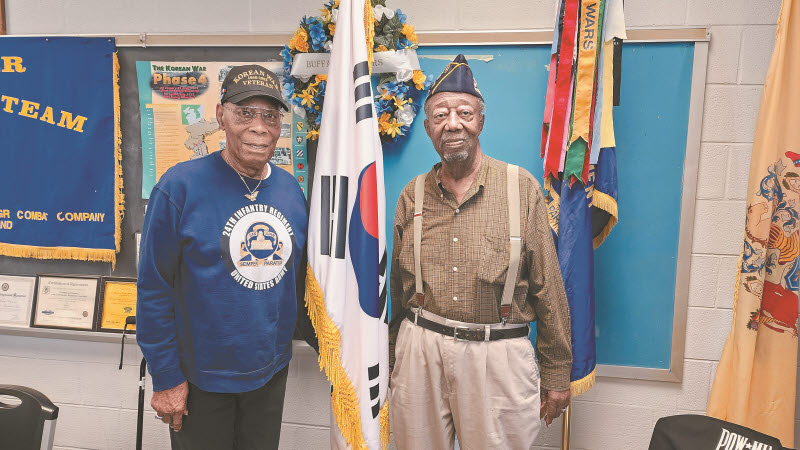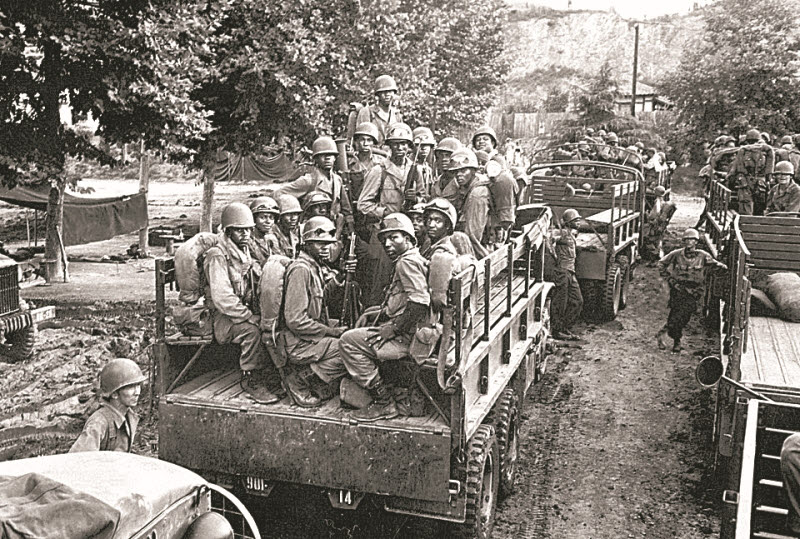In August 1950, James Thompson, then an 18-year-old private in the U.S. Army’s 24th Infantry Regiment, defended Seobuksan Mountain (735m) in Haman, a key gateway to the provisional capital of Busan, after 19 back-and-forth battles against North Korean forces.
Thompson, now 92 and a retired master sergeant, recalled the battle as the first joint operation between South Korea and the United States, which is considered a milestone marking the start of the 71-year-old U.S.-South Korea alliance.
However, few remember that the 24th Infantry Regiment, a key unit in the battle, was composed of African American soldiers known as the “Buffalo Soldiers.” Of the approximately 1,000 U.S. soldiers who died in the battle for Seobuksan, more than half were African Americans.

On October 7, in an office of the “Buffalo Soldiers Veterans Association” near a community center in New Jersey, Thompson pointed to a faded photograph of a young soldier. “That was me, 74 years ago, heading toward the Nakdong River front,” he said.
The following is an edited excerpt from the interview:
– What was the experience of African American soldiers during the war?
“In 1948, President Harry Truman ordered the desegregation of the military, but many white officers refused and continued to operate segregated units. Up until World War II, Black soldiers were assigned non-combat roles like transportation and cooking. However, when the Korean War broke out, we were ordered to fight. We arrived in Busan on July 13, 1950, but received different supplies than the white soldiers. We were stationed in Yecheon, and by July 15, we were already in battle. Many soldiers died from enemy mortar fire, but we faced elite North Korean troops with just rifles, without tank or artillery support.”
– What did you do after the Nakdong River battle?
“The records written by white soldiers won’t show it, but the 24th Regiment was actually the first to reclaim Seoul. After we began fighting the North Korean forces, the Marines were deployed and took the city. We advanced all the way to the Yalu River, but we weren’t even given winter supplies. I remember how unbearably cold it was. The command placed Black soldiers on the front lines in battles with the highest casualty rates. That was their way.”

– Many Koreans are unfamiliar with the Buffalo Soldiers.
“I met President Park Geun-hye at a U.S.-South Korea alliance banquet in 2013. She stopped in front of me and asked, ‘Are you a Buffalo Soldier?’ Then she shook my hand, bowed, and said, ‘If it weren’t for you, I wouldn’t be standing here today,’ expressing her gratitude several times. Of the more than 6,000 Buffalo Soldiers who went to Korea, only six remain.”
Robert Gross, a fellow veteran and retired master sergeant, showed the Ambassador for Peace Medal he had received, remarking, “President Park was right. A nation that forgets its history cannot have a future alliance.” He lamented that proper recognition is still lacking in the U.S. Despite Korean American Senator Andy Kim introducing a bill last February to award the Buffalo Soldiers with a Congressional Gold Medal, no progress has been made.
– Do you have a message for future generations?
“Many of my brothers and soldiers sacrificed their lives in the name of peace. I hope that the younger generations in both countries never forget this history and remember why we call the U.S.-South Korea relationship a ‘blood alliance.’”
BY TAEHWA KANG, YOUNGNAM KIM [thkang@joongang.co.kr]




